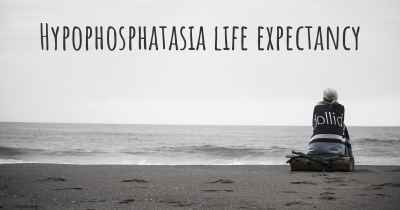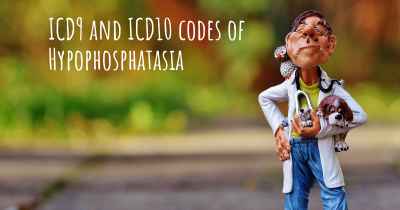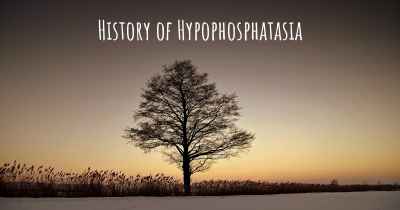Is Hypophosphatasia hereditary?
Here you can see if Hypophosphatasia can be hereditary. Do you have any genetic components? Does any member of your family have Hypophosphatasia or may be more predisposed to developing the condition?

Hypophosphatasia is indeed a hereditary condition. It is caused by mutations in the ALPL gene. This gene is responsible for producing an enzyme called alkaline phosphatase, which is crucial for bone and tooth development. Inheriting a mutated ALPL gene from one or both parents can result in the development of hypophosphatasia. The severity of the condition can vary depending on the specific gene mutations inherited.
Hypophosphatasia (HPP) is a rare genetic disorder that affects the development and mineralization of bones and teeth. It is caused by mutations in the ALPL gene, which provides instructions for producing an enzyme called alkaline phosphatase (ALP). ALP plays a crucial role in the mineralization process, which is essential for the formation and maintenance of healthy bones and teeth.
Is Hypophosphatasia hereditary?
Yes, Hypophosphatasia is inherited in an autosomal recessive manner. This means that both parents must carry a copy of the mutated ALPL gene in order for their child to develop the condition. When both parents are carriers, there is a 25% chance with each pregnancy that their child will inherit two copies of the mutated gene and be affected by Hypophosphatasia.
It is important to note that individuals who inherit only one copy of the mutated gene from one parent are considered carriers of Hypophosphatasia. Carriers typically do not show symptoms of the disorder but can pass the mutated gene on to their children.
Types of Hypophosphatasia
Hypophosphatasia can manifest in various forms, ranging from mild to severe, depending on the specific mutations in the ALPL gene. The severity of the condition is primarily determined by the residual ALP enzyme activity in the affected individual.
1. Perinatal (lethal) Hypophosphatasia: This is the most severe form of Hypophosphatasia and is usually evident before birth or shortly after. Babies with perinatal Hypophosphatasia often have skeletal abnormalities, respiratory problems, and a high risk of death in the first few months of life.
2. Infantile Hypophosphatasia: This form of Hypophosphatasia typically presents within the first six months of life. Infants with this condition may experience poor growth, skeletal abnormalities, delayed motor development, and a high risk of fractures.
3. Childhood Hypophosphatasia: Children with this form of Hypophosphatasia may have similar symptoms to those with infantile Hypophosphatasia, but the onset is typically later, between 6 months and 18 years of age. They may also experience dental problems, such as premature loss of primary teeth.
4. Adult Hypophosphatasia: This is the mildest form of Hypophosphatasia and often goes undiagnosed until adulthood. Symptoms may include recurrent fractures, bone pain, dental problems, and early tooth loss.
Diagnosis and Genetic Testing
Diagnosing Hypophosphatasia involves a combination of clinical evaluation, biochemical testing, and genetic analysis. The measurement of ALP enzyme activity in blood or other tissues can provide valuable information, as individuals with Hypophosphatasia typically have low levels of ALP. Genetic testing can confirm the presence of mutations in the ALPL gene and help determine the specific type of Hypophosphatasia.
Genetic counseling is highly recommended for individuals or families with a history of Hypophosphatasia or those who have been diagnosed with the condition. A genetic counselor can provide information about the inheritance pattern, the likelihood of passing on the mutated gene, and the available options for family planning.
Management and Treatment
Currently, there is no cure for Hypophosphatasia, and treatment focuses on managing the symptoms and complications associated with the condition. The management plan may involve a multidisciplinary approach, including orthopedic specialists, dentists, geneticists, and other healthcare professionals.
Treatment options may include:
- Supportive care: This involves addressing symptoms and providing appropriate interventions to improve quality of life. For example, physical therapy may be recommended to improve motor function and prevent fractures.
- Enzyme replacement therapy (ERT): ERT involves the administration of a synthetic form of the ALP enzyme to compensate for the deficiency. However, ERT is currently only approved for the treatment of perinatal and infantile Hypophosphatasia.
- Investigational therapies: Ongoing research is exploring potential therapeutic approaches, such as gene therapy and small molecule drugs, to address the underlying genetic cause of Hypophosphatasia.
Conclusion
Hypophosphatasia is a hereditary disorder caused by mutations in the ALPL gene. It is inherited in an autosomal recessive manner, meaning both parents must carry a copy of the mutated gene for their child to be affected. The severity of Hypophosphatasia can vary depending on the specific mutations and is classified into different types. Genetic testing and counseling are essential for individuals and families affected by Hypophosphatasia to understand the inheritance pattern and make informed decisions. While there is currently no cure for Hypophosphatasia, supportive care and investigational therapies aim to manage symptoms and improve the quality of life for affected individuals.








